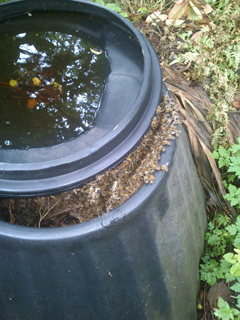 There has been a lot of media coverage recently about honeybees having problems caused by habitat loss, pesticides, climate change, etc resulting in a diminishing of their numbers. Well, obviously the bees have heard about this because they have had a season of intense swarming activity across the whole of Cornwall, one fellow Swarm Coordinator receiving 18 telephone calls from members of the public reporting swarms – in one day!
There has been a lot of media coverage recently about honeybees having problems caused by habitat loss, pesticides, climate change, etc resulting in a diminishing of their numbers. Well, obviously the bees have heard about this because they have had a season of intense swarming activity across the whole of Cornwall, one fellow Swarm Coordinator receiving 18 telephone calls from members of the public reporting swarms – in one day!
Even my bees at home have shown increased swarming proclivity this year, though the colonies in my out-apiaries have gone about their business of collecting nectar without causing me any extra work (apart from one, which I will tell you about in a minute).
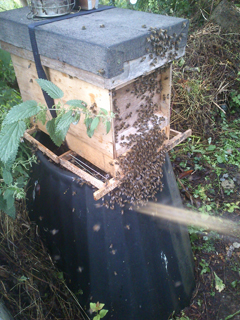 Whereas last year it was just one home colony that swarmed, this year five of my colonies decided they had better do their bit to propagate the species. Luckily, I caught all the escapees and re-housed them, though I am aware of at least one swarm in Portloe that did not appear to be from any of my colonies – but I captured that as well (it was the one in the chimney!), so no harm done and the bees are happy in their new home.
Whereas last year it was just one home colony that swarmed, this year five of my colonies decided they had better do their bit to propagate the species. Luckily, I caught all the escapees and re-housed them, though I am aware of at least one swarm in Portloe that did not appear to be from any of my colonies – but I captured that as well (it was the one in the chimney!), so no harm done and the bees are happy in their new home.
The most recent swarm here was hanging on the branch of a tree in the apiary and looked like an elongated drain pipe – it was about 4′ long and 6” in diameter! Some swarm! In Tregony also there has been much bee activity – I retrieved 3 swarms within about 150yds of one another during this past month, one in a cavity wall, one in a dustbin, and even one in an old sofa that was on its way to the tip but had been placed temporarily outside on the lawn!
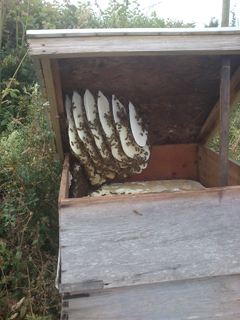 Finally, last week, I received a call from Radio Cornwall saying there was a swarm in a litter bin on East Street in Newquay causing all manner of mayhem, though the reporter’s slant was more on why the bees were doing this rather than being concerned about getting a beekeeper to retrieve it! Nonetheless, I contacted one of our members and he went out to do the job and I did the interview which I know some of you heard.
Finally, last week, I received a call from Radio Cornwall saying there was a swarm in a litter bin on East Street in Newquay causing all manner of mayhem, though the reporter’s slant was more on why the bees were doing this rather than being concerned about getting a beekeeper to retrieve it! Nonetheless, I contacted one of our members and he went out to do the job and I did the interview which I know some of you heard.
So why do bees swarm? Normally, it is because of a shortage of laying space for the queen, or shortage of nectar storage space for the bees – or even shortage of space to house the actual number of bees in the hive. One of my out-apiary hives at Portscatho suffered from the latter, and, like the Tregony colony I mentioned last time (nowhere near the swarms I was called out to, by the way!), decided to decamp from the inner hive boxes to the cavity between the inner boxes and the outer covers!
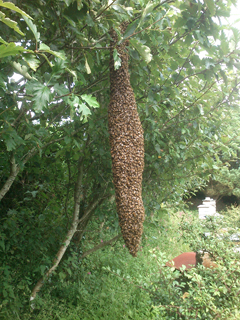 In the Portscatho case, they went into the roof space, between the top of the inner boxes and the roof itself. They had built 6 lovely, though small, combs by the time I realised there was a problem and great fun it was cutting those combs out, tying them into empty frames, and putting those combs (and the queen and bees) back into the bottom inner box where they belonged. When I checked the following week, all was fine, as by then I had removed several full frames of honey and replaced them with empty frames, so the bees had a lot more space and also plenty of work to do in drawing out new comb to keep them occupied.
In the Portscatho case, they went into the roof space, between the top of the inner boxes and the roof itself. They had built 6 lovely, though small, combs by the time I realised there was a problem and great fun it was cutting those combs out, tying them into empty frames, and putting those combs (and the queen and bees) back into the bottom inner box where they belonged. When I checked the following week, all was fine, as by then I had removed several full frames of honey and replaced them with empty frames, so the bees had a lot more space and also plenty of work to do in drawing out new comb to keep them occupied.
So, having given my bees enough space satisfying all three requirements, why did some of them still swarm? I can only put it down to the hot weather, or perhaps poorly produced queens from last year, who, perhaps, had not mated properly and were seen to be deficient in some way by the bees. But who knows for sure? The only thing we can do in the absence of concrete facts is be vigilant, plan ahead in terms of giving the bees what they might need – early – and be ready to respond to calls from the public when a swarm is found.
 Of course, not all calls turn out to be honeybee swarms. A lot are actually bumblebee nests or wasp nests that have been disturbed, or spotted, and are causing anxiety to the callers. One lady, again from Tregony, called to say that I had been very helpful last year in retrieving a swarm from her daughter’s Wendy House, so she was calling me again about a swarm of bees going up the overflow pipe into the water tank in her attic and could I offer some advice.
Of course, not all calls turn out to be honeybee swarms. A lot are actually bumblebee nests or wasp nests that have been disturbed, or spotted, and are causing anxiety to the callers. One lady, again from Tregony, called to say that I had been very helpful last year in retrieving a swarm from her daughter’s Wendy House, so she was calling me again about a swarm of bees going up the overflow pipe into the water tank in her attic and could I offer some advice.
On talking it through with her, I concluded it was unlikely to be honeybees, and in fact it turned out to be Vespa Germanica, the German wasp, which had to be exterminated by a Pest Controller. Whilst even wasps have their place and uses in Nature, if they are causing a nuisance or present a danger to members of the public, we have no choice but to accept extermination. Very rarely, this also applies to honeybees but Pest Controllers are required to contact a beekeeper before killing honeybee colonies, just to make sure there is no possibility of retrieving the honeybees first.
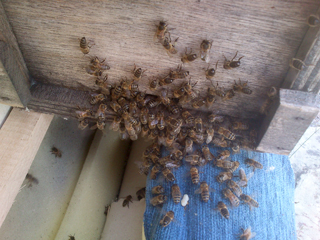 Next month I’ll hopefully be talking about things other than swarming, but in the meantime, and it’s not too late in the season for this to happen, if you see a swarm of honeybees, please get in touch (not by email, as one person from Penwith did a few weeks back – by the time I read the email the swarm had long gone!) and I will arrange for someone to retrieve it.
Next month I’ll hopefully be talking about things other than swarming, but in the meantime, and it’s not too late in the season for this to happen, if you see a swarm of honeybees, please get in touch (not by email, as one person from Penwith did a few weeks back – by the time I read the email the swarm had long gone!) and I will arrange for someone to retrieve it.
Colin Rees – 01872 501313 – colinbeeman@aol.com

